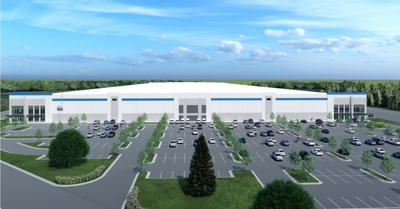The Charleston region’s once-red-hot industrial real estate market has turned downright chilly.
“The boom in industrial construction starts seen in 2022 has subsided,” according to a report by the local office of commercial real estate firm Avison Young.
The three-county region — Charleston, Berkeley Dorchester — once had nearly 12 million square feet coming out of the ground as the pandemic drove an unprecedented surge in imported goods and the need for new warehouses and distribution centers.
About 2.5 million square feet of industrial space is expected to break ground in 2024, according to the Avison Young report.
On the bright side: “This slowdown in new inventory should allow demand to catch up with the rapidly growing supply,” the firm said.
The Charleston market saw “negative absorption” of industrial space — meaning supply outstripped demand — for the first time since 2020 during the first quarter of this year.
Average base rents are down by 6 percent compared to 2023.
“The average base rent is trending downward for the first time since 2020,” according to the report, which notes rents “should increase throughout the year as demand catches up with supply.”
Vacancy rates, which once hovered between 2 percent and 4 percent, now stand at 11.6 percent, including both direct-lease and sublease properties. The I-26 corridor in outlying Berkeley County, where most of the industrial construction has taken place in recent years, had the highest vacancy rate at 16.1 percent during the first quarter.
A handful of big projects are still in the works, most notably the 1.3 million-square-foot Palmetto Logistics Center that Dallas-based Dalfen Industrial will bring online this quarter at the Palmetto Commerce Park in North Charleston.
But developers and banks are growing more reluctant to foot the bill for new speculative buildings — those without a committed tenant.
The local decline, while steep, isn’t anywhere near as pronounced as what’s happening nationally.
Absorption of available industrial space in the U.S. declined by 70 percent year-over-year in the first quarter, according to real estate group Newmark. “A breather, a recalibration period, a soft landing — any or all of the above terms are appropriate,” Lisa DeNight, managing director for the New York-based company, said in a report.
Mark Russo, vice president of Savills, a global real estate firm, told Bisnow Media the industrial market “is still generally healthy, but the big problem in terms of vacancy moving so quickly is the excess amount of supply that has been delivered over the last two years ...”
He added “tenants are starting to realize they definitely have some leverage now.”
Bucking the trend
One industrial segment that doesn’t appear to be affected by the slowdown — server farms.
The Wall Street Journal reported last week that there is a “frenzy to build data centers to serve the exploding demand for artificial intelligence,” cloud computing and other digital services.
And that’s creating a shortage of the parts, property and power that the sprawling supercomputer warehouses require.
The lead time to get the electricity-hungry cooling systems to keep a center’s servers operating is now five years, the Journal reported, while delivery times for backup generators has gone to about two years from about 30 days.
That’s forcing internet firms like Google to scour the country for locations with cheap real estate and available power sooner rather than later. It can take up to two years to develop a data center once all the regulatory hurdles have been cleared.
Google has found two such locations in Dorchester County — one near St. George, the other west of Summerville at the Pine Hill Business Campus — where the Alphabet Inc. subsidiary secured historic government tax breaks and electric rates from Dominion Energy that are roughly half of what residential customers pay.
The planned data centers will join an existing Google server farm at the Mount Holly Commerce Park in Berkeley County.
The amount of data center space in the U.S. grew 26 percent in 2023, according to real-estate firm CBRE, and a record amount was under construction, the Journal noted. Bill Vass, vice president of engineering at Amazon Web Services, told the newspaper a new data center pops up somewhere in the world every three days.
While data centers can be a huge drain on natural resources, they typically don’t create many jobs.
That’s not necessarily a bad thing, according to attorney Burnie Maybank, a former director of the S.C. Department of Revenue who helped draft the state’s incentives legislation for data centers. The law requires a capital investment of at least $50 million and the creation of at least 25 jobs paying at least 150 percent of the per-capita income within the county.
That’s an annual salary equaling at least $76,029 in Berkeley and $71,662 in Dorchester — something that “ain’t a bad day at the office,” Maybank said.
Scaling up
Mount Pleasant-based transportation firm Tradd Advisory Co. is expanding its operations with a nearly $89,000 investment that it said will create 100 jobs over the next five years.
The company offers third-party logistics services for shippers, including full truckload, less-than-truckload and expedited shipments.
Tradd also offers truck moves from most major U.S. ports, including the Port of Charleston. The company recently moved into the Harbour Entrepreneur Center at 11 eWall St., off the frontage road that runs parallel to Johnnie Dodds Boulevard.
CEO and owner Stephen Scates said one of the company’s goals is to “become a household name in the freight industry.”











